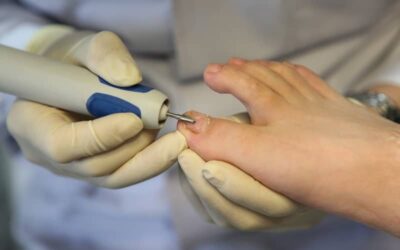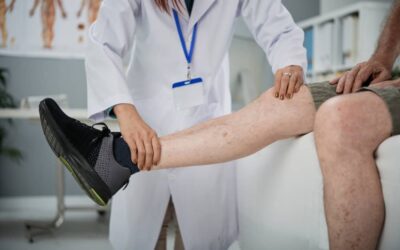Many people have heard tragic stories about someone whose uncle with diabetes needed to have an amputation. With your own diabetes diagnosis, hearing such a story can make you nervous. Are you resigned to the same fate? The short answer is not if you don’t want to be.
Neuropathy
With elevated blood sugar levels, your body is more prone to develop neuropathy. Neuropathy is when the nerves in your extremities (your hands, feet, arms, and legs) begin to lose sensation. They might start tingling more, or you may realize you have a blister, but you didn’t ever feel it form.
Neuropathy can be dangerous because if you lose feeling in your hands and feet, you may unknowingly injure yourself and then not be able to care for the injury properly. We see our hands often, so it’s harder for an injury to go unnoticed there. Our feet, however, might not be receiving the same attention.
What is a Foot Ulcer?
Foot ulcers develop when a sore becomes infected. The infection goes deep into the foot, making it difficult to heal properly. Foot ulcers can take weeks to heal completely, and without proper treatment, they might not heal at all.
Preventing a Foot Ulcer
An ounce of prevention is worth a pound of cure. Here are ways you can prevent a foot ulcer from developing on your feet:
- Thoroughly wash and dry your feet daily. Using lukewarm water, wash your feet daily. Use a soft towel to completely dry your feet and toes. Moisturize the top and bottom of your foot.
- Daily inspect your feet. Check for any discoloration, pain, swelling, cuts, blisters, dry skin, corns, calluses, unusual smells, localized warmth, or rashes. Call a podiatrist if you notice any of these. You do not want to remove any warts, skin, or corn on your own; let a podiatrist specializing in diabetic foot care help you.
- Keep your toenails trimmed. Overgrown toenails increase your risk of ingrown toenails, which could lead to complications with your diabetes. Keeping your toenails groomed will help reduce your risk of this complication.
- Regulate your blood sugar. Keeping your blood sugar within range decreases your risk of complications with neuropathy and foot ulcers.
- Choose your shoes wisely. Ulcers can develop when one part of the foot receives more pressure than the rest. Choose shoes that help distribute the pressure evenly.
- Defer to a podiatrist. In case you skipped the second bullet point, we’re going to repeat it here because it is important. If you have a corn or wart that needs to be removed, let a professional handle it. An infection from an unsterilized tool can quickly turn something as simple as corn into an ulcer.
Caring for a Foot Ulcer
If you suspect you already have a foot ulcer, call your diabetic podiatrist. They are best suited to help you remove any excess skin, clean out any foreign objects within the ulcer, and dress it. Once a podiatrist has helped you, you may be given instructions to manage your ulcer from home.
Keeping the foot ulcer moist with saline, an antibiotic ointment, and proper dressing will help the wound heal as quickly as possible. The dressing will need to be changed each day so it stays fresh and clean. As you dress your ulcer, try to avoid putting pressure on it.
Another way to help a foot ulcer heal is to manage your blood sugar. When blood sugar levels are high, your body has a difficult time healing the open wound on your extremities; your body is trying to keep you alive. If you can keep your blood sugar in range, you can increase blood flow, which will, in turn, increase the white blood cell response to the wound.
Risk Factors
Obesity, high blood pressure, smoking, and elevated blood sugar not only increase your risk of developing a foot ulcer, but they also keep ulcers from healing properly. If you have a diabetic foot ulcer and want it to heal as fast as possible, quitting smoking and keeping your blood sugar levels managed are two great ways to start.
If you were recently diagnosed with diabetes, don’t jump to worst-case amputation scenarios. Amputation is far from inevitable with the right care. Talk to your podiatrist and endocrinologist. They can give you a personalized plan to keep you healthy and on your feet.



